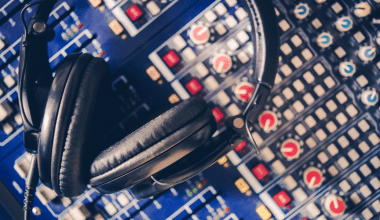Whether you’re a seasoned vocalist or just starting, having the right professional mic for singing is essential. A high-quality microphone doesn’t just capture your voice; it elevates your performance, ensuring your vocals shine in every recording or live session.
With so many options on the market, choosing the perfect mic can be overwhelming. Should you go for a dynamic microphone or a condenser? What about frequency response and polar patterns? In this guide, we’ll break down everything you need to know about professional microphones for singing.
Table of Contents
- Why a Professional Mic Matters for Singing
- Types of Professional Mics for Singing
- Dynamic Microphones
- Condenser Microphones
- Ribbon Microphones
- Key Features to Look for in a Singing Mic
- Top Professional Mics for Singing in 2024
- Choosing the Right Mic for Your Voice Type
- Best Professional Mics for Studio Singing
- Best Professional Mics for Live Singing
- Caring for Your Professional Mic
- Budget-Friendly Options for Aspiring Singers
- Conclusion
Why a Professional Mic Matters for Singing
A professional mic is an investment in your craft. Here’s why it matters:
- Superior Sound Quality: Professional microphones capture every nuance of your voice.
- Durability: Built to last, these mics handle rigorous use.
- Adaptability: Many professional mics work well in diverse environments, from studios to stages.
- Enhanced Vocal Clarity: A high-quality mic ensures your vocals are crisp and clear, making you stand out.
Whether you’re recording in a home studio or performing live, the right mic amplifies your talent.
Types of Professional Mics for Singing
When choosing a professional mic for singing, understanding the different types is crucial.
Dynamic Microphones
Dynamic mics are durable and versatile. They’re great for live performances due to their ability to handle high sound pressure levels (SPL).
- Pros: Affordable, durable, and resistant to feedback.
- Cons: Less sensitive to subtle vocal nuances.
Condenser Microphones
Condenser mics are popular for studio recordings. They offer high sensitivity and capture detailed vocal textures.
- Pros: Excellent sound quality and wide frequency response.
- Cons: Fragile and require phantom power.
Ribbon Microphones
Ribbon mics are a favorite for vintage-style recordings. They deliver warm, natural tones.
- Pros: Smooth sound and excellent for soft vocals.
- Cons: Expensive and delicate.
Key Features to Look for in a Singing Mic
When buying a professional mic for singing, consider the following features:
- Frequency Response: Choose a mic that complements your vocal range.
- Polar Pattern: Cardioid mics are ideal for isolating vocals, while omnidirectional mics capture ambient sound.
- Sensitivity: Higher sensitivity means better capture of vocal nuances.
- Build Quality: Ensure the mic is sturdy, especially for live performances.
- Connectivity: Check for compatibility with your equipment (XLR or USB).
These factors help you select a mic tailored to your needs.
Top Professional Mics for Singing in 2024
Here are some of the best professional microphones for singing:
Shure SM7B
- Type: Dynamic
- Ideal For: Studio and live vocals
- Features: Wide frequency range, excellent noise isolation.
Rode NT1-A
- Type: Condenser
- Ideal For: Studio recordings
- Features: Low self-noise, detailed sound capture.
Neumann TLM 103
- Type: Condenser
- Ideal For: Professional studios
- Features: Pristine sound quality, high sensitivity.
AKG C414 XLII
- Type: Condenser
- Ideal For: Versatile studio use
- Features: Multiple polar patterns, rich vocal textures.
Choosing the Right Mic for Your Voice Type
Your voice type significantly impacts your choice of a professional mic for singing.
- For High-Pitched Voices: Look for mics with smooth high-frequency response (e.g., AKG C414).
- For Deep Voices: Opt for mics with warm tonal characteristics (e.g., Shure SM7B).
- For Softer Voices: Choose highly sensitive mics like the Rode NT1-A.
Testing multiple microphones can help you find the best fit for your unique voice.
Best Professional Mics for Studio Singing
When recording in a studio, clarity and precision are vital. Here are the best mics for studio singing:
- Audio-Technica AT4040
- Neumann U87 Ai
- Blue Yeti Pro
Studio mics often require proper acoustic treatment for optimal performance.
Best Professional Mics for Live Singing
Live performances demand durable microphones that handle feedback well. Top picks include:
- Shure SM58: A classic for live vocals.
- Sennheiser e935: Excellent for dynamic performances.
- Electro-Voice RE20: Known for its clarity and versatility.
Live mics often feature cardioid patterns to minimize background noise.
Caring for Your Professional Mic
Proper care ensures your professional mic for singing lasts longer:
- Store Safely: Use a padded case to prevent damage.
- Clean Regularly: Wipe the mic with a soft, dry cloth.
- Avoid Moisture: Keep the mic away from humidity.
- Handle Gently: Avoid dropping or shaking the mic.
Regular maintenance preserves sound quality and longevity.
Budget-Friendly Options for Aspiring Singers
Not every professional mic for singing has to break the bank. Here are some affordable yet high-quality options:
- Behringer C-1
- Samson Q2U
- Audio-Technica AT2020
These mics are perfect for beginners or singers on a budget.
Conclusion
Choosing the right professional mic for singing can transform your sound. Whether you’re recording in a studio or performing live, investing in the right microphone ensures your vocals are captured in the best possible way. From dynamic to condenser and ribbon microphones, the options are vast. By understanding your voice type, performance needs, and budget, you’ll find the perfect mic to elevate your singing career.
Explore the options, test different models, and take your vocals to the next level with the right professional mic.
Related Articles:
For further reading, explore these related articles:
- Best Professional Microphone for Singing: A Detailed Guide
- Find the Perfect Professional DJ Mixer for Your Setup
- Master Tracks Online Free: Professional Guide to Get Started
For additional resources on music marketing and distribution, visit Deliver My Tune.






